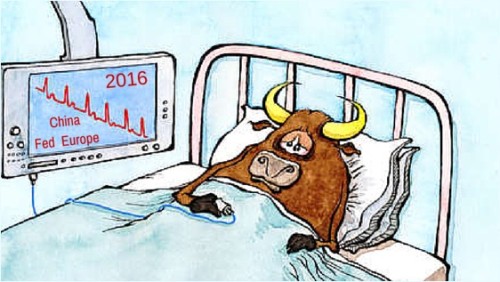
The Last Bull-Market Pillar Collapses
When I search for new stocks for investment yield, there’s one data point I always take a look at: the company’s ability to return capital to shareholders.
It’s one of the most important pieces of information to consider when looking for stable, dividend-paying stocks. Essentially, I want to see if the company has the wherewithal to pass cash flow back to shareholders, thereby increasing our wealth in the process.
There are several ways companies can accomplish this, with paying a dividend being the most direct method.
One common method of returning shareholder value — share buybacks — may be stalling out. While this may seem somewhat innocuous, the decline in stock buybacks may be a sign that we could be entering the next stock market recession any day now.
Share buybacks are attractive for investors for a few reasons.
Value Walk
Are We On The Right Track To An Oil Price Recovery?
Oil prices have increased 60 percent since late January. Is this an oil-price recovery? Two previous price rallies ended badly because they had little basis in market-balance fundamentals. The current rally will probably fail for the same reason. The Oil Glut Worsens But Prices Reach 2016 Highs Although oil prices reached the highest levels so far in 2016 during the past few days, the global over-supply of oil worsened in March. EIA data released this week shows that the net surplus (supply minus consumption) increased to 1.45 million barrels per day (Figure 1). Compared to February, the surplus increased 270,000 barrels per day. That’s a bad sign for the durable price recovery that some believe is already underway. (Click to enlarge) Figure 1. EIA world liquids market balance (supply minus consumption). Source: EIA STEO April 2016 Labyrinth Consulting Services, Inc. The production freeze that OPEC plus Russia will discuss […]
Saudi Prince Reiterates Oil Freeze Depends on Others Joining
Saudi Arabia won’t restrain its oil production unless other producers, including Iran, agree to freeze output at a meeting this weekend in Doha, the kingdom’s deputy crown prince said. The world’s biggest crude exporter would cap its market share at about 10.3 million to 10.4 million barrels a day, if producers agree to the freeze, Prince Mohammed bin Salman said during an interview on Thursday at King Salman’s private farm in Diriyah, the original home of the Al Saud royal family. “If all major producers don’t freeze production, we will not freeze production,” said Prince Mohammed, 30, who has emerged as Saudi Arabia’s leading economic force. “If we don’t freeze, then we will sell at any opportunity we get.” At least 15 nations including Saudi Arabia and Russia, the world’s two largest crude oil producers, will gather in Doha on April 17 to discuss freezing output to stabilize an […]
Iran insists it will not be party to any freeze, as Zanganeh to skip Doha meeting
Iranian oil minister Bijan Zanganeh will not attend Sunday’s high profile gathering of OPEC and major non-OPEC producers in Doha, given that Iran has no intention of participating in any production freeze agreement, the country’s oil ministry said Friday. “Considering Iran’s plan to revive its share of the global crude oil market after full annulment of unfair sanctions and the fact that this issue has been discussed in bilateral and multilateral meetings with oil and energy ministers of OPEC and non-OPEC producers… the Iranian oil minister will not take part in this meeting,” said Akbar Nematollahi, director general for the oil ministry’s public relations bureau, according to oil ministry news service Shana. However, he said Iran “supports any effort by OPEC and non-OPEC countries to bring back stability to the oil market and global oil prices.” Iran’s delegation to Doha will instead be headed by its OPEC governor Hosein […]
Moves to impeach Brazil's Rouseff could signal return of dictatorship to one of world's largest
ONCE again, the light of progress is going out across Latin America. Brazil, loudly trumpeted this decade as a shining example of global economic development, is on the brink of a constitutional coup to unseat President Dilma Rousseff — a process that could return the country to chaos and dictatorship.
Other Latin American nations, principally Venezuela, are at the same dangerous crossroads. But wobbly Brazil is special and not because it is hosting the Olympic Games. With a population of more than 200 million, Brazil is the world’s seventh largest economy, measured by purchasing power parity. In other words, Brazil is a problem right on our own doorstep. It is also the story of how a national popular movement against austerity can fail disastrously.
The backstory is this. Like most Latin American countries, Brazil is divided between a rabidly right-wing, white middle class (drawing its wealth from a narrow base of commodity exports and rentier income) and a mass of poor people of mixed race. History has oscillated between authoritarian governments to protect the establishment and populist presidents swept to power (temporarily) by the masses. Because neither side has been able to transform the economy decisively – to break out of the cycle of dependency on commodity exports – political instability and endemic corruption have been the norm. Only four of the eight presidents elected in Brazil since 1950 served their full term in office.

